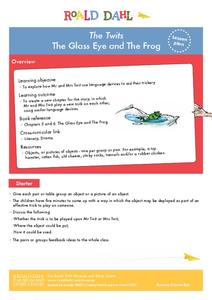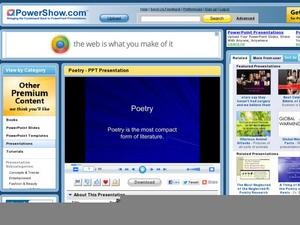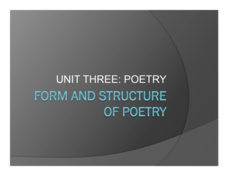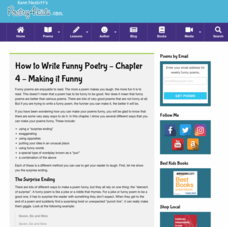Curated OER
What is Figurative Language?
Need a review of literary terms and figurative language? Although text heavy, these slides clearly define frequently used terms and provide color-coded examples.
Roald Dahl
The Twits - The Glass Eye and the Frog
What do a pair of stinky socks and a toy hamster have in common? The third lesson in an 11-part unit designed to accompany The Twits by Roald Dahl uses silly objects to teach about figurative language. Zany pranks and role play make for...
Curated OER
Poetry: The Most Compact Form of Literature
Introducing or need to review literary devices and terms for a study of poetry? Though text heavy, the explanations and examples of key poetic devices will provide learners with the vocabulary they need to discuss and craft poems.
Curated OER
Knights of the Round Table adapted by Gwen Ross
Everyone loves the tales involving King Arthur and his knights. After reading Knights of the Round Table by Gwen Gross, learners draw inferences and conclusions, analyze story elements, and discuss figurative language, including...
Curated OER
Identifying Figurative Language #1
In this identifying types of figurative language worksheet, students read sentences and phrases, determine if they are similes, metaphors, hyperboles, personifications, or a combination, identify the type/s and write an explanation of...
Curated OER
Theater: Create a Script
Figurative language is the focus in the book Teach Us, Amelia Bedelia. After reading Peggy Parish's book, class members dramatize idioms from the text, using dramatic strategies such as characterization, exaggeration, and improvisation....
Curated OER
"Champion of the World"
“Champion of the World,” a chapter from Maya Angelou’s I Know Why the Caged Bird Sings, is the subject of a study guide that asks readers to consider the author’s purpose, the function of the chapter in the entire narrative, and...
Springfield Public Schools District 186
Form and Structure of Poetry
If anyone suffers from metrophobia—the fear of poetry—the PowerPoint on the elements of poetry may help alleviate their worries. The presentation introduces learners to poetic elements, including simile, metaphor, and personification....
Curated OER
How I Spent My Summer Vacation
Students hear the story How I Spent My Summer Vacation by Wallace Bleef and share their own summer experiences. They write a tale about one event that happened during their summer using exaggeration.
Curated OER
Yellow Journalism in the Spanish-American War
Students write a newspaper based on events in the year 1898 using Yellow Journalism, the exaggeration of facts or events.
Curated OER
A Picture Speaks A Thousand Words
Students explore the power of images through political cartoons, particularly in light of the Danish caricatures of Muhammad that have incited violence around the world. They create their own original artwork to submit to an appropriate...
Curated OER
The Notorious Hope Diamond: What Makes an American Legend?
Learners view and discuss a video on the legend of the Hope Diamond then compare and contrast other tales such as Paul Bunyan, Pecos Bill and Johnny Appleseed. They analyze basic characteristics of these legends then use descriptive...
Curated OER
Satire: A Matter of Tone
Satire, anyone? After a review of terms associated with satire, viewers are directed to craft a 500-600 word piece of satire about a familiar hypocrisy.
Curated OER
Short Story 2
Seventh graders review previous reading of Rikki Tikki Tavi. They discuss prior knowledge of simile, metaphor, idiom, and hyperbole. Students practice using vocabulary words from the story by listing synonyms for them. Students read from...
Curated OER
Urban Legends
Irony, hyperbole, and other rhetorical devices are at play in this presentation about urban legends. Several examples of urban legends help to clarify the analysis, making it valuable for those who have a hard time wrapping their mind...
Curated OER
Persuasive Writing Skills Worksheets
What makes you want to buy that new car? Or vote for that popular politician? Study the persuasive techniques commonly found in advertisements or argumentative writing, including repetition, exaggeration, and fact vs. opinion.
Reed Novel Studies
Third Grade Angels: Novel Study
A million things to do, a ton of homework ... hyperbole sure does help get the point across! With the novel study for Jerry Spinelli's Third Grade Angels, scholars practice writing their own exaggerated sentences. Additionally, they...
Reed Novel Studies
Summer of the Monkeys: Novel Study
There are more than 260 types of monkeys in the world. With the novel study for Wilson Rawls' Summer of the Monkeys, pupils research interesting facts about the banana-loving primates. They also practice exaggeration, write similes, and...
Poetry4kids
How to Write Funny Poetry — Chapter 4: Making It Funny
You've got your topic—now how do you make your poem funny? Explore ways to make a poem humorous, including puns, exaggeration, silly words, and surprising endings, with a helpful poetry lesson.
Reed Novel Studies
Wolf Hollow: Novel Study
Annabelle, a young character in Wolf Hollow, discovers one bully can ruin everything when Betty walkes into her classroom. Betty bullies others and targets a war veteran. Individuals read how one person changed Annabelle's life. They...
Reed Novel Studies
The Witches: Novel Study
Are witches like lions in sheep clothing? A boy and his grandmother in The Witches thinks so. They have even discovered the secret to recognizing these evil beings that disguise themselves as sweet ladies. Scholars use the resource to...
Reed Novel Studies
Rules: Novel Study
Have you ever been so focused on others, that a look in the mirror surprises you? It seems that Catherine, a character in Rules, does just that when she focuses so much on her autistic brother's behaviors that she is surprised by her own...
K20 LEARN
Here's How I Heard It: Using Folklore To Improve Close Reading Skills
"X" is for exaggeration, and "F" is for fact. To encourage close reading and to improve literary analysis skills, class members annotate fables and tall tales, like Paul Bunyan, with symbols that identify key features of this genre.
Newseum
Weed Out Propaganda
Young scholars study four essential propaganda techniques: Simplification, Exploitation, Exaggeration, and Division (S.E.E.D.). Individuals select an example of propaganda from the past and present then compare how the key elements have...
Other popular searches
- Hyperbole Examples
- Hyperbole Worksheets
- And Hyperbole
- Hyperboles
- Hyperbole or Exaggeration
- Hyperbole Elementary
- Poetry and Hyperbole
- Hyperbole in Poetry
- Writing Using Hyperbole
- Hyperbole Worksheet 6th
- Idioms and Hyperbole
- Hyperbole Examples Pictures





















